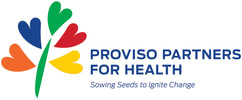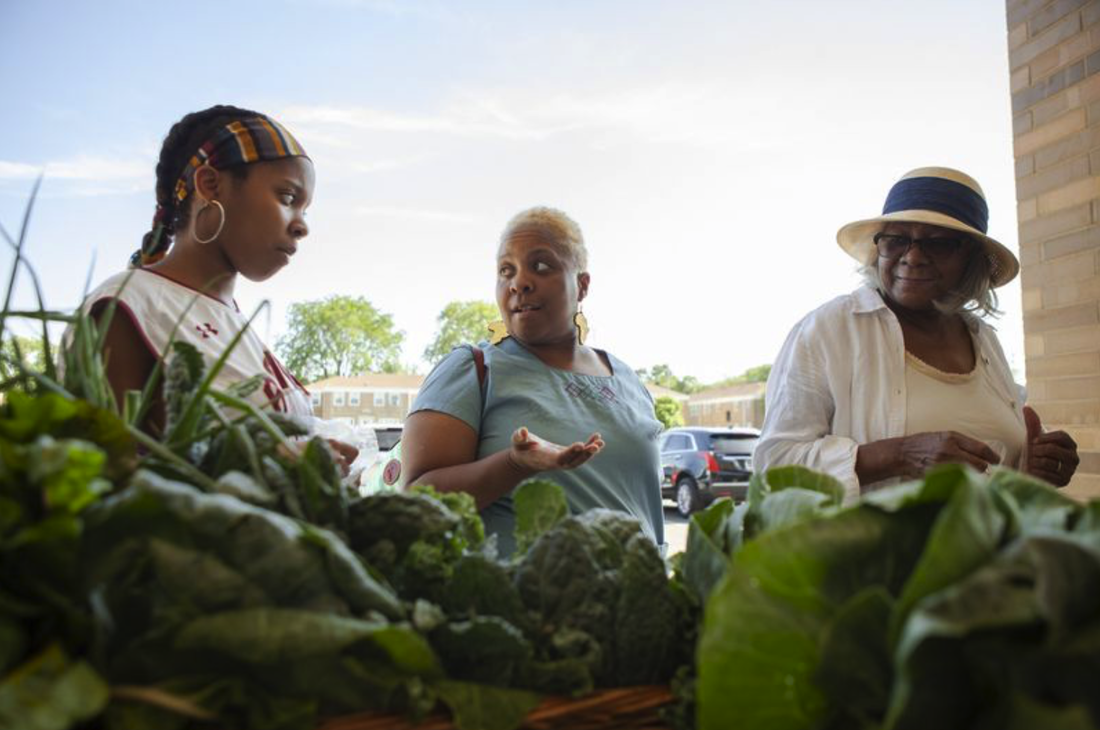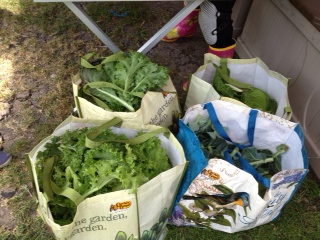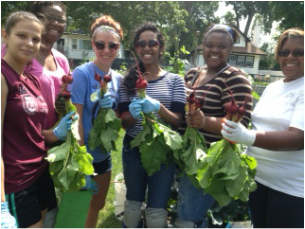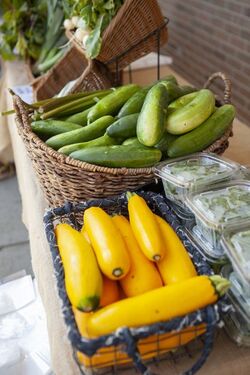 Cucumbers and squash from the Veggie RX produce stand, grown by Windy City Harvest. (Stacey Rupolo / for the Chicago Tribune) Cucumbers and squash from the Veggie RX produce stand, grown by Windy City Harvest. (Stacey Rupolo / for the Chicago Tribune) VeggieRX provides free vegetables to low-income people and patients in Chicago food deserts By NICOLE BLACKWOOD CHICAGO TRIBUNE | AUG 02, 2019 | 4:02 PM Ashley Moore, a resident of Oak Park with limited income, travels to Maywood each Thursday for fresh produce. The trek is not entirely by choice, she said. Affordable vegetables aren’t readily available in her area, and she’s been focused on healthy eating of late. But Maywood is a food desert. Cucumbers and squash from the Veggie RX produce stand, grown by Windy City Harvest, in front of Loyola Medical Center in Maywood on Aug 1, 2019. (Stacey Rupolo / for the Chicago Tribune) VeggieRX, a program implemented by Windy City Harvest, now in partnership with Loyola Medicine and Proviso Partners for Health, has cropped up to fill the void for Maywood residents and individuals like Moore. The program, which now operates year-round, has branches in Austin and North Lawndale, and is currently tied to Loyola’s Maywood clinic. “Rather than waiting for an outside grocery store to come in, or somebody, somewhere, to fix the problem, we asked the question: ‘What could our local Maywood community do to create our own local food system?’” said Lena Hatchett, co-founder of Proviso Partners for Health. The answer provided by VeggieRX, piloted in 2016 and now funded by the U.S. Department of Agriculture, is simple: provide Link Card recipients and patients referred by their medical provider with a box of free, fresh produce, drawn from Windy City Harvest (a Chicago Botanic Garden farming initiative). The public is also able to purchase produce. Broadly, VeggieRX is a means of addressing widespread food insecurity, which Hatchett defines as “the lack of affordable, available, culturally appropriate foods to sustain active living.”
But VeggieRX distinguishes itself from other food programs in its intentional avoidance of stigma: instead of handing out food with no instruction, participants learn ways to cook it. Mary Mora, a Loyola dietitian, leads the cooking demonstrations, which are open to the public. The byproduct of education, Mora said, is community, formed and reformed weekly. “The participants are sharing what they do with the vegetables. They make recipes that we don’t talk about or that we don’t make, and it’s a great opportunity for all of us to learn from each other how to use the vegetables and share ideas,” Mora said. Last week, she and participants made grilled vegetables, including pickled turnips. The key, she said, is demonstrating simple recipes that won’t intimidate even the most hesitant of cooks. When you’re on a budget and have limited resources, Moore said that you buy nonperishable goods by default, but “VeggieRX makes it easy to choose the right choice.” This is part of the program’s design, according to Windy City Harvest coordinator Britt Calendo: Make vegetables as accessible as possible, and people will sustain healthy habits automatically. “We’re humans and so we like convenience, and if we can make fresh produce convenient, it’s going to be easier for people to incorporate in their life, and it’s one less barrier,” Calendo said. “When people are living in areas without a lot of resources, it’s not just food that’s not accessible. We’re hoping to remove a barrier in someone’s life to make it easier to cook for themselves.” And Dr. Aaron Michelfelder, chair of Loyola Medicine’s Department of Family Medicine, said that healthy eating is not only a personal lifestyle decision — it is, he said, “a real need” to sustain health. Calendo said that VeggieRX began in part because of demand from health providers, who wanted their patients to eat more fresh produce and were frustrated by its lack of availability. Because of Loyola’s involvement in the program, Michelfelder often refers patients to VeggieRX; patients participate in food insecurity screenings, but Michelfelder keeps a close eye on patients who are overweight, have diabetes or high blood pressure. Having the farm stand outside the Maywood clinic, Calendo said, ties together diet and health and places an emphasis on preventing disease. “We know vegetables improve health,” Michelfelder said. “A lot of people take for granted access to vegetables. We’re finally making sure the vegetables are coming in to our underserved communities.” Eventually, Moore hopes the free produce will be available to all residents. She believes everyone can benefit from nutrition education. But for now, Hatchett said, the focus of VeggieRX is on sustaining community, keeping the program’s scale small to understand its effectiveness. Average attendance is 15 to 20 individuals per week. But at least something is working. Michelfelder recalled a patient’s reaction when she tried Mora’s vegetables for the first time: “I didn’t know you could grow vegetables like this locally.” VeggieRX is held Thursdays from 4-6 p.m. at Loyola Center for Health in Maywood, 1211 W. Roosevelt Road. [email protected]
0 Comments
Your comment will be posted after it is approved.
Leave a Reply. |
Proviso Partners For HealthCheck our Events section regularly to find out what awesome things are happening in our area. We invite you to find opportunities to get involved! Categories
All
Archives
February 2024
|
